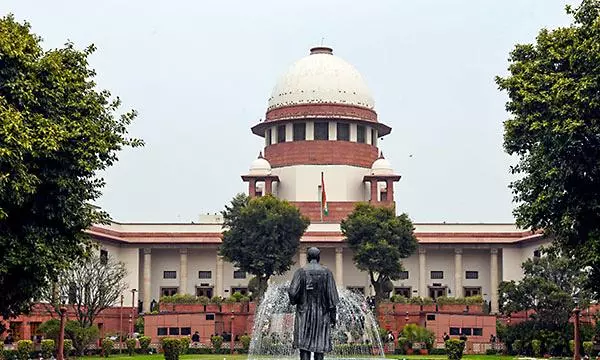
Places of Worship Act: SC bars registration of fresh suits till further orders
Apex court says in pending suits like Gyanvapi, courts should not pass effective interim or final orders, including orders for survey

The Supreme Court on Thursday (December 12) restrained all the courts in the country from entertaining and passing any effective interim or final orders on any lawsuits seeking reliefs including survey of religious places under the 1991 law.
A three-judge bench of Chief Justice Sanjiv Khanna, and Justices Sanjay Kumar and K V Viswanathan gave the order while hearing a batch of petitions challenging the validity of certain provisions of the 1991 law that prohibits filing a lawsuit to reclaim a place of worship or seek a change in its character from what prevailed on August 15, 1947.
Hold any orders: SC tells courts
The bench said no fresh suit would either be filed or registered till its further orders and in the pending cases, the courts would refrain from any “effective interim or final order” till its further orders.
Also read: Places of Worship Act part of basic structure of Constitution: Activist
“We are examining the vires, contours and the ambit of 1991 Act,” the bench said, observing it would be appropriate to ask all other courts to “stay off their hands”.
SC asks Centre to reply to pleas
Several lawyers, appearing for Hindu side, opposed the order saying it should not be passed without hearing them.
The bench asked the Centre to file its reply to the pleas and cross ones in four weeks and granted a further of four weeks to other parties to file their rejoinder after the Centre filed its reply.
The bench would accord the hearing after completion of pleadings.
It, meanwhile, allowed pleas of various parties including Muslim bodies seeking to intervene in the proceedings.
Why petitioners want certain provisions deleted?
One of the petitioners, Ashwini Upadhyay, had prayed that sections 2, 3 and 4 of the Places of Worship (Special Provisions) Act, 1991, be set aside.
Also read: Gyanvapi Mosque: Why SC-ordered ASI survey will open the floodgates
Among the various reasons submitted was the contention that these provisions take away the right of judicial remedy to reclaim a place of worship of any person or a religious group.
Law protects secularism: CPI(M)
The Communist Party of India (Marxist) and Maharashtra MLA Jitendra Satish Awhad have also filed pleas against several pending petitions challenging the constitutional validity of the legislation, saying the law protected public order, fraternity, unity and secularism of the nation.
Also read: Gyanvapi panel challenges pleas against 1991 Worship Act in SC
The matter will be heard in the backdrop of several suits filed in various courts, including those related to the Gyanvapi Mosque in Varanasi, Shahi Idgah Mosque in Mathura and Shahi Jama Masjid in Sambhal, claiming these were built after destroying ancient temples and seeking permission to allow the Hindus to offer prayers there.
Gyanvapi, Shahi Idgah mosques at centre of debate
The Muslim side, in most of these cases, has cited the 1991 law to argue that such suits are not maintainable.
As many as six petitions, including those filed by former Rajya Sabha MP Subramanian Swamy, have been filed against the provisions of the 1991 law.
Swamy wanted the apex court to "read down" certain provisions to enable Hindus to stake claim over the Gyanvapi Mosque in Varanasi and Shahi Idgah Mosque in Mathura, while Ashwini Upadhyay claimed the entire statute was unconstitutional and no question of reading down arises.
Also read: India’s Constitution secular yes, but courts pandering to Hindu majority demands
The doctrine of reading down a law is generally used to save a statute from being struck down entirely subject to adjudication over its constitutionality.
Provisions of the law
On the other hand, Jamiat Ulama-i-Hind had cited the five-judge Constitution bench judgement in the Ram Janmabhoomi-Babri Masjid title case, noting the reference to the Places of Worship (Special Provisions) Act, 1991, to argue that the law cannot be set aside now.
The top court had on March 12, 2022, sought the Centre's response to the plea filed by Upadhyay challenging the validity of certain provisions of the law.
Also read: Hindu groups want fast-track courts for Mathura, Kashi temple disputes
The petition alleged the 1991 law creates an "arbitrary and irrational retrospective cut-off date" of August 15, 1947, for maintaining the character of the places of worship or pilgrimage against encroachment done by "fundamentalist-barbaric invaders and law-breakers".
The 1991 law prohibits conversion of any place of worship and provides for the maintenance of the religious character of any place of worship as it existed on August 15, 1947, and for matters connected therewith or incidental thereto.
The law had made only one exception – on the dispute pertaining to the Ram Janmabhoomi-Babri masjid in Ayodhya.
(With inputs from agencies)

